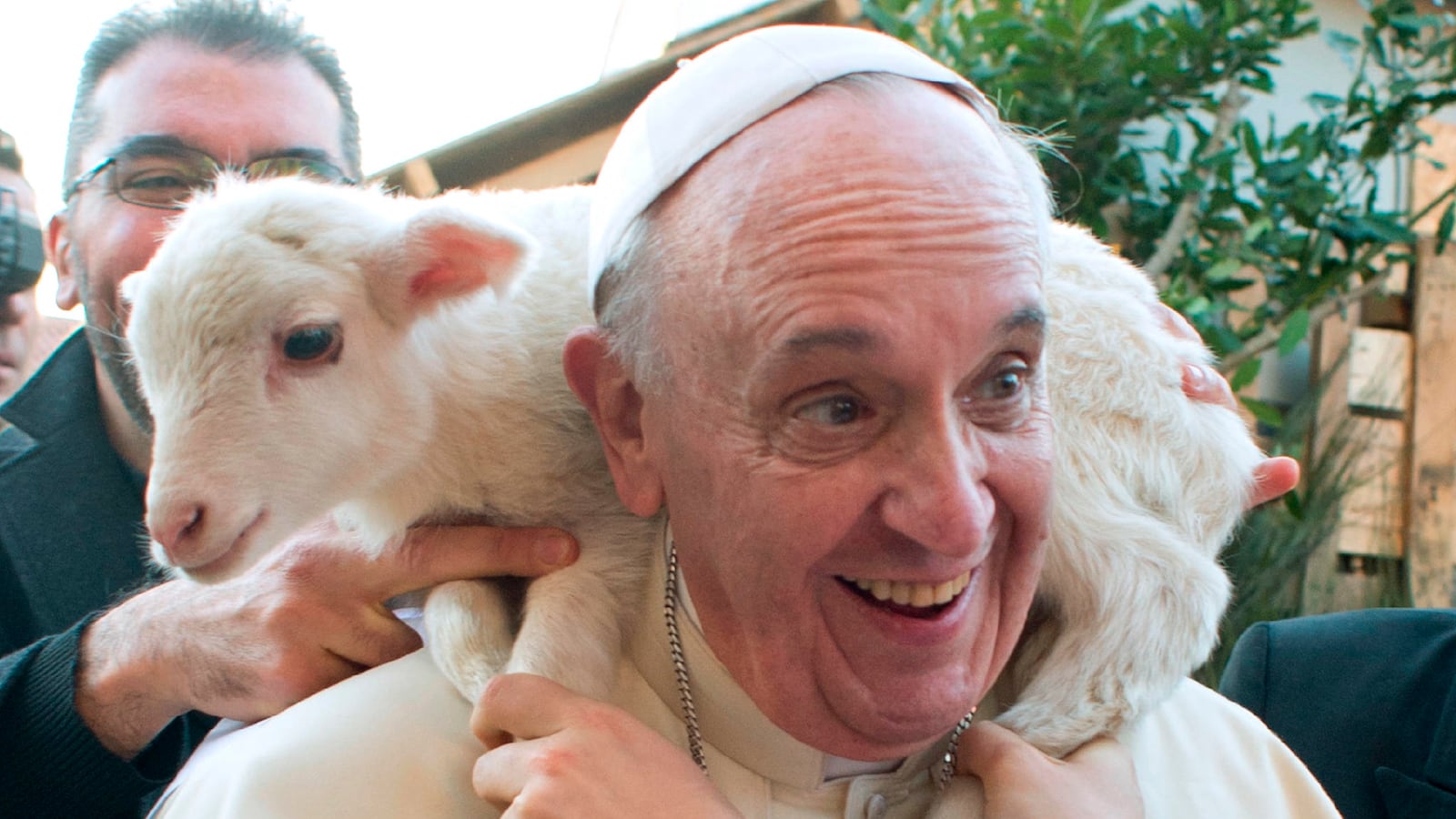This week the media exploded with the news that fan favorite Pope Francis had opened the pearly gates to the entirety of the animal kingdom. According to initial reports Francis had been comforting a small boy over the death of his dog, when he declared, "One day we will see our animals again in eternity of Christ. Paradise is open to all God’s creatures." Even The New York Times ran the story on the front page.
This is the progressive Francis we all know and love: he’s willing to talk about the divorced and remarried receiving communion and he boldly extends “all dogs go to heaven” beyond its customary canine-exclusive borders.
Except Francis didn’t actually say this. As David Gibson revealed this week, it was a different Pope—Pope Paul VI, who died in 1978—who gave the young boy the soothing pep talk. That’s the Francis effect: he gets the credit for every nice thing a Pope has ever said.
But whether we’re talking about Paul VI or Francis, Popes are animal lovers. Like his predecessor Pope Benedict XVI—who had to be told not to bring stray cats (and their blessed fleas) into his Vatican apartments—Francis has a soft spot for strays. He was delighted when he recently received two donkeys—Thea and Noah—as Christmas gifts from the Italian company Eurolactic Italia. Francis is a donkey milk connoisseur and donkey’s milk is a non-hipster alternative to human and cow milk.
Product placement aside, the idea that animals go to heaven raises a whole host of interesting questions for Thea and Noah. Will his donkeys continue to serve as beverage dispensers for the Holy Father in heaven? Will there be a heavenly dairy industry?
Pope Paul VI’s comment seems to imply that we see “our animals” again in heaven. Good news for Thea and Noah, no doubt. But does this means that animal ownership continues in heaven? Don’t animals get to choose who they hang out with?
What about the, er, smell in the celestial menagerie? Will these resurrected animals be house-trained and know to exit the pearly gates before doing their business? This may be less of a concern than it seems. In his City of God, Augustine was quite clear that in the hereafter humans would no longer need bathroom breaks. We can probably extend that to animals as well.
When we say “all animals,” do we really mean it? Or do we just mean the Buzzfeed listicle kind? What about the snake from the Garden of Eden? While Christian tradition consistently maintains that the snake was Satan in disguise, that interpretation isn’t in the Bible. Does the wise-talking reptile get a pass, while the fate of infants who die before they are baptized continues to be subject to debate?
Perhaps the biggest question is whether animals are eligible for salvation. Francis’s vision for the church is certainly all-embracing—he’s willing to baptize aliens, after all—but can animals be baptized? Can they make the requisite professions of faith, be recipients of divine grace, and perform (don’t shout at me, Protestants) good works that glorify God? And if they can’t and don’t have to, isn’t that a little unfair? A number of clearly partisan studies have suggested that cats are unfeeling and sociopathic. Are sociopathic animals in while sociopathic people burn in hell?
Certainly, when it comes to the theological community, Francis is in the minority. The Catechism of the Catholic Church does make some fairly ambiguous provisos for the fate of animals in general, but these aren’t clearly distinguished from the expectations of rocks. In 2008 then Pope Benedict XVI stated quite pointedly that animals are “not called to the eternal life.” He stated—quite rightly—that animals are never mentioned in connection with eternal life in the Bible. It’s true that Noah took animals onto the ark twosies by twosies in Genesis, but it’s also true that he sacrificed a whole bunch of them once he hit dry land (if you’re wondering if this is how the dinosaurs died out, the answer is no).
The eighth-century Biblical prophet Isaiah famously described an idyllic time in the future when the “the wolf shall dwell with the lamb, and the leopard shall lie down with the young goat.” But even if heaven isn’t one big snuggle fest, attitudes to non-human animals in Christianity deserve some attention.
In an interview given before he became Pope, Cardinal Ratzinger stated, “Degrading … living creatures to a commodity seems to me in fact to contradict the relationship of mutuality that comes across in the Bible.” The mutual relationship of animals and human beings is something Catholic theologians worry about more and more.
Charles Camosy, Associate Professor of Christian Ethics at Fordham and author of For the Love of Animals, told me, “The Bible is very clear: our relationship with animals is one of mutuality … They are not mere tools and things we can treat as a pure commodity—and, indeed, torture and kill in factory farms so we can put artificially cheap meat on our plates without having to think about it.” When asked if the eternal reward for animals made a difference, Camosy replied that Catholic opposition to animal cruelty “is not dependent on whether [animals] go to heaven… but I think they do.”
Could someone please bury me with a can of Raid just in case he’s right?






